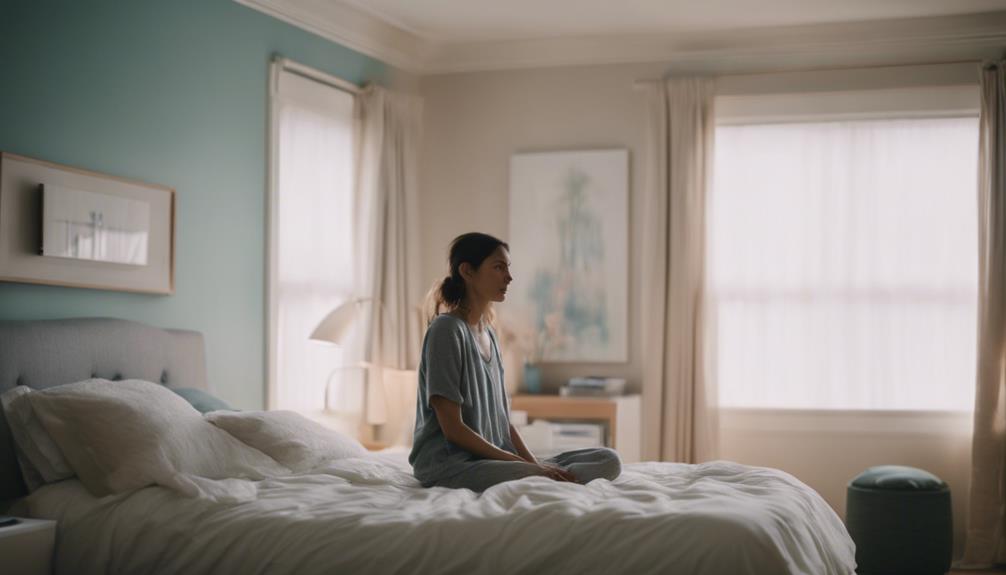
Improving sleep quality involves shifting mindsets to appreciate the significance of sleep cycles and positive attitudes towards rest. Understanding the stages of sleep and how external factors impact sleep-wake patterns is essential. Creating a calming bedtime routine with soothing elements like soft lighting and peaceful rituals sets the stage for restful nights. Incorporating mindfulness practices and cultivating a sleep-inducing environment enhance overall well-being. Managing stress and anxiety, along with enhancing sleep hygiene habits, contribute to better sleep quality. Setting realistic sleep goals further supports a positive mindset for a restful night's sleep.
Key Takeaways
- Educate on sleep science to change beliefs.
- Implement calming bedtime routines for better sleep.
- Practice mindfulness techniques before bed.
- Create a sleep-inducing bedroom environment.
- Maintain a sleep journal to identify patterns.
Understanding Sleep Cycles
Understanding sleep cycles is necessary for optimizing our restorative rest and overall well-being. Sleep is divided into different stages, with the most well-known being rapid eye movement (REM) and non-REM stages. Each stage plays an important role in the body's recovery and cognitive functions.
The circadian rhythm, often referred to as the body's internal clock, regulates the sleep-wake cycle over a 24-hour period. This rhythm is influenced by external factors such as light and darkness, which signal the body to produce or suppress melatonin, a hormone that induces sleep.
During the night, individuals typically cycle through various stages of sleep multiple times, progressing from light sleep to deep sleep and REM sleep. REM sleep is particularly essential for cognitive processes and emotional regulation.
Understanding these sleep stages and the role of the circadian rhythm can help individuals develop healthier sleep habits and improve the quality of their rest. By aligning our routines with our natural sleep cycles, we can enhance our overall well-being and feel more rejuvenated each day.
Identifying Negative Sleep Beliefs

Recognizing and addressing harmful beliefs about sleep is essential for improving overall sleep quality and well-being. It is common for individuals to hold negative beliefs or assumptions about sleep that can impact their ability to get restful sleep.
By exploring these beliefs and challenging assumptions, individuals can begin to reframe their thoughts and cultivate a more positive mindset towards sleep.
Here are three key steps to help identify and address negative sleep beliefs:
- Self-Reflection: Take time to reflect on your beliefs about sleep. Are there any negative thoughts or misconceptions that may be contributing to your sleep difficulties?
- Education: Learn more about the science of sleep and the factors that contribute to healthy sleep patterns. Understanding the importance of sleep can help change perspectives and beliefs.
- Seeking Support: Consider seeking support from a healthcare professional or therapist if negative sleep beliefs are significantly impacting your sleep quality. They can provide guidance on reframing thoughts and developing healthier beliefs surrounding sleep.
Cultivating a Relaxing Bedtime Routine

How can individuals establish a calming bedtime routine to promote better sleep quality and relaxation?
Creating a relaxing bedtime routine is essential for preparing the mind and body for restful sleep. Incorporating elements such as soothing scents, calming music, cozy pajamas, and dim lighting can greatly improve the quality of your sleep.
Soothing scents like lavender or chamomile can help to relax the mind and body, indicating that it is time to unwind.
Calming music, such as soft instrumental melodies or nature sounds, can create a peaceful atmosphere conducive to sleep.
Wearing comfortable pajamas can signal to your body that it is time to wind down and prepare for rest.
Adjusting the lights in your bedroom can help trigger the production of melatonin, the hormone responsible for regulating sleep.
Practicing Mindfulness for Better Sleep

Cultivating mindfulness can greatly enhance sleep quality and promote restful nights. By incorporating mindfulness practices into your bedtime routine, you can calm the mind and body, making it easier to drift off to sleep peacefully.
Here are three key ways to practice mindfulness for better sleep:
- Mindful Breathing and Relaxation Techniques: Engage in deep breathing exercises before bed to help relax your body and quiet your mind. Focus on each breath in and out, feeling the sensation fully. Combining this with progressive muscle relaxation can release tension and prepare your body for sleep.
- Sleep Meditation: Dedicate a few minutes to sleep meditation to clear your mind of worries and stress. Guided meditation can help you let go of the day's events and enter a state of deep relaxation conducive to sleep.
- Visualization Exercises: Picture a calming scene or scenario in your mind, such as a serene beach or a peaceful forest. Visualization can help redirect your thoughts away from anxieties, allowing you to ease into a restful slumber.
Creating a Sleep-Inducing Environment

Establishing a conducive sleep environment is crucial for optimizing your chances of getting a restful night's sleep. One key element in creating such an environment is ensuring that your bedroom is cozy and inviting. To achieve this, think about using soft, comfortable bedding, calming colors, and minimal clutter.
A tidy and organized space can help calm the mind and signal to your brain that it is time to wind down for the night.
Another important factor to contemplate is incorporating soothing sounds into your sleep environment. This could involve playing white noise, nature sounds, or gentle music to create a peaceful atmosphere. Such sounds can mask disruptive noises from outside and promote relaxation, making it easier for you to fall asleep and stay asleep throughout the night.
Managing Stress and Anxiety

Addressing stress and anxiety is essential for enhancing your overall sleep quality and promoting a restful night's rest. When stress and anxiety are left unchecked, they can profoundly impact your ability to fall asleep and stay asleep.
Here are some effective techniques to help manage stress and anxiety for better sleep:
- Deep Breathing: Utilize deep breathing exercises to calm your mind and body before bedtime. Inhale deeply through your nose, hold for a few seconds, then exhale slowly through your mouth. Repeat this process several times to reduce stress levels.
- Progressive Relaxation: Practice progressive relaxation by tensing and then relaxing each muscle group in your body. Start from your toes and work your way up to your head, focusing on releasing tension as you go. This technique can help alleviate physical tension and promote a sense of calmness.
- Mindfulness Meditation: Engage in mindfulness meditation to cultivate awareness of the present moment without judgment. This practice can help you acknowledge and let go of stressful thoughts, allowing for a more peaceful state of mind conducive to better sleep.
Enhancing Sleep Hygiene Habits

Improving your sleep hygiene habits entails adopting practices that optimize your sleep environment and bedtime routine. One effective way to enhance your sleep hygiene is by utilizing sleep trackers. These devices can help monitor your sleep patterns, providing valuable insights into the quality and duration of your rest.
By identifying trends and disturbances in your sleep, you can make informed decisions to improve your overall sleep quality.
In addition to utilizing technology, incorporating herbal remedies into your bedtime routine can also promote better sleep hygiene. Herbal remedies such as chamomile tea, valerian root, or lavender essential oil have been traditionally used to relax the mind and body, helping to induce a state of calm conducive to sleep.
These natural alternatives can be a gentle yet effective way to unwind before bedtime, signaling to your body that it's time to rest.
Setting Realistic Sleep Goals

To optimize your sleep quality, it is essential to set realistic sleep goals that align with your lifestyle and individual needs. Setting achievable objectives can help improve your overall well-being and productivity.
Here are three key steps to guide you in setting realistic sleep goals:
- Utilize Sleep Tracking Tools: Consider using sleep apps or devices to monitor your sleep patterns accurately. These tools can provide valuable insights into your sleep quality and help you identify areas for improvement.
- Maintain a Sleep Journal: Keeping a sleep journal can help you track your bedtime rituals, daily activities, and sleep duration. This practice can assist in identifying patterns or habits that may be affecting your sleep negatively.
- Establish Bedtime Rituals: Create a calming bedtime routine to signal to your body that it's time to wind down. This could include activities like reading, meditating, or taking a warm bath, helping you relax and prepare for a restful night's sleep.
Frequently Asked Questions
How Does Technology Impact Sleep Quality?
Technology's blue light can disrupt sleep by suppressing melatonin production. Excessive screen time can lead to sleep disturbances and exacerbate technology addiction. Implementing better sleep hygiene, like restricting screen use before bed, can help improve sleep quality.
Can Food Choices Affect Sleep Patterns?
Just as a harmonious symphony relies on every note, nutrition impacts sleep quality. Wise dietary habits can influence sleep patterns positively. Understanding how food choices affect rest can lead to better restful nights.
Is Napping Beneficial for Overall Sleep Quality?
Napping can offer benefits by reducing sleep debt, enhancing alertness, and boosting cognitive function. However, drawbacks may include disrupting nighttime sleep patterns. Strategic, short naps can be beneficial, but excessive or late naps may impede overall sleep quality.
What Role Does Exercise Play in Improving Sleep?
Exercise benefits play a pivotal role in improving sleep quality. Engaging in physical activity helps regulate sleep patterns, reduces stress, and promotes relaxation. It's like a lullaby for the body, enhancing overall well-being and contributing to a healthy sleep routine.
How Can Social Interactions Influence Sleep Habits?
Social interactions, such as family dynamics and work relationships, can greatly impact sleep habits. Positive relationships can provide emotional support, reduce stress, and promote a sense of well-being, all of which can contribute to better sleep quality.
Conclusion
To sum up, by changing mindsets and adopting healthy sleep habits, individuals can enhance their overall sleep quality.
Just as a gardener tends to their plants with care and attention, nurturing the appropriate conditions for growth, so too must we care for our sleep routines.
By recognizing the significance of sleep cycles, challenging negative beliefs, and establishing a tranquil sleep environment, we can foster a peaceful and revitalizing night's rest.





